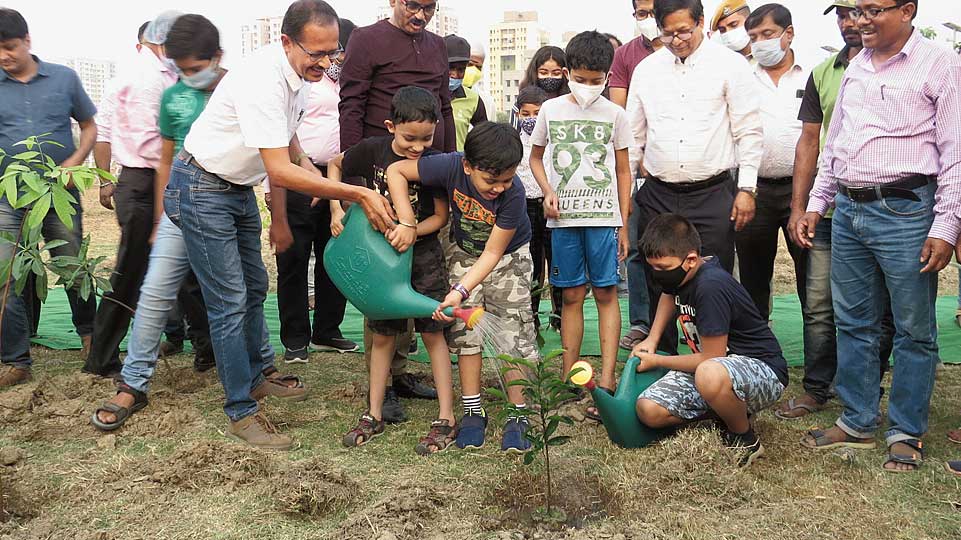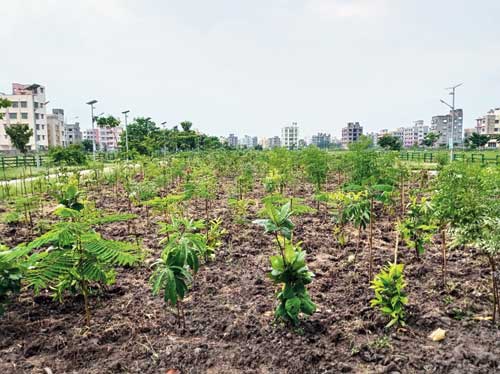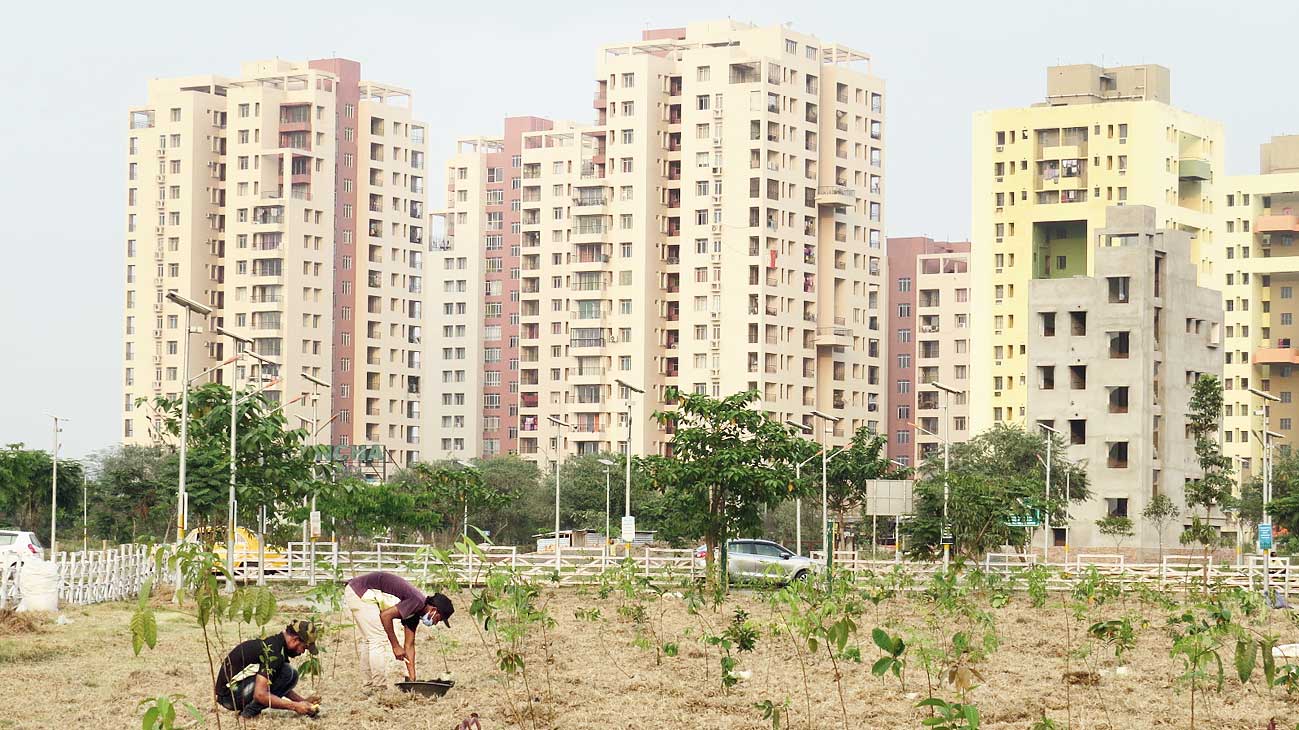In a city where hundreds of Covid patients are gasping for oxygen, an oxygen generation plant is coming up, quietly and naturally.
This is a piece of land measuring about 2.4 acres, adjacent to Tank 15 in Action Area IIB of New Town, which has been home to about 1,000 saplings of a variety of flowering and fruit-bearing trees over the last couple of months.
“An individual consumes as much oxygen as is generated by 16 trees in a lifetime. But how many do we plant? Urban environment does not have the biodiversity to draw its own sustenance. That is why we are looking to grow green patches in a city that is fast losing its green cover,” said Suhrid Chandra of Hari Mitti Foundation, which is behind the initiative.
The foundation approached NKDA with the proposal and was allotted the area to plant trees in. “Last year, a total of 4,563 trees were destroyed by Cyclone Amphan. We transplanted some, even then many were lost. We had targeted planting 10,000 trees and achieved it with the help of many organisations and individuals. This year, too, we have targeted planting 10,000 trees but in a different way,” said NKDA chairman Debashis Sen, who was attending the launch of the plantation.

Children water a sapling planted by NKDA officials at the inauguration in March. Sudeshna Banerjee
Nurture offer
The NKDA has earmarked pockets in almost all residential blocks of New Town and is seeking offers for adoption by corporate bodies, organisations and individuals. “The land will remain NKDA property and the produce of the trees cannot be taken away by the adoptive partner. The tenure of adoption is 11 months and is subject to renewal with mutual consent,” Sen clarified.
The NKDA has about 40 such plots, which are proving tough to maintain because of wild growth after every monsoon. “We have decided to go for plantation in these plots. Each green verge will have one kind of tree, be it neem or guava, pomelo or pomegranate. We have also spoken to the Coconut Development Board. The area near Biswa Bangla Gate is called Narkelbagan because of the trees that used to be there. We want to revive coconut trees in New Town,” said Sen.
The adoptive partner would have to bear some initial expenses for plantation, manuring, deweeding etc. “But after about three years or so, they will sustain on their own and give lifelong returns,” he pointed out.
Such green verges would increase the overall green cover of the township and break the monotony of an urban landscape. They would also provide space for physical activity, relaxation, peace and escape from the heat.
The first such plot designated for a green verge has been handed to Hari Mitti Foundation, which is being supported by Red Cow Dairy.
Survival of the fittest
“This plot, as an experiment, will have a variety of trees. They are employing the Miyawaki method, named after Japanese botanist Akira Miyawaki, which reduces the recommended gap between two saplings while planting. This way, there will be a competition among the trees for survival. All trees will compete for sunlight and water. Some that are not genetically strong will not survive, only the fittest will. But the trees will grow much quicker and create a biodiverse green verge,” the NKDA chairman explained.
Chandra, who is supervising the plantation, said his aim was to grow a mixed jungle. “We have chosen the kinds of trees of which birds love fruits or prefer to build nests in. Indigenous species have been chosen — Mango, Arjun, Mahogany etc. They are also of varying heights-from Guava to Krishnachura which will lead to layering of trees. Such a mixed plantation will create biodiversity on its own and be 30 times denser. The leaves will fall and decompose, triggering the growth of microorganisms, which in turn will develop a fungal network and lead to exchange of nutrition between trees.” Trees, he claimed, interacted with each other.

A view of the plot on Monday Sudeshna Banerjee
Community garden
Hari Mitti promotes community garden. “It is being said that food is medicine. But the food we eat is full of pesticides and chemicals which are causing cancer. Our drive encourages people to grow their own vegetables,” Chandra said.
Over the last five years, the organisation has been growing rooftop kitchen gardens. “Work is in progress on 150 roofs across the city.”
Hari Mitti also owns a farm in Narayanpur, near Sonarpur, which is divided into 600sq ft plots. “Those who do not have a roof of their own can rent such a plot. They can choose the vegetables they want to grow which we will provide. They can do the planting themselves or we can do so on their behalf. At harvest time too, if they cannot come to collect the crop, we can collect it and reach the produce at their doorstep. That way they are assured of pure organic food.”
The foundation also trains farmers to go the organic way in growing paddy, pulses or oil seeds and markets their produce. “Without such an end-to-end solution, farmers grow disheartened to hear long speeches by NGOs who leave them to fend for themselves once they grow the crop.”
He urged residents of Action Area IIB to come forward and take care of the trees. “Plants respond to love,” he told audience members present at the launch who volunteered to water the saplings.
“I planted a sickly-looking sapling at the inauguration but after regular watering it is now standing erect and grown more than double in height. It is a source of great satisfaction for me and my son who goes with me,” said Dipanjan Bhowmik of Mallika Malancha on Monday.










